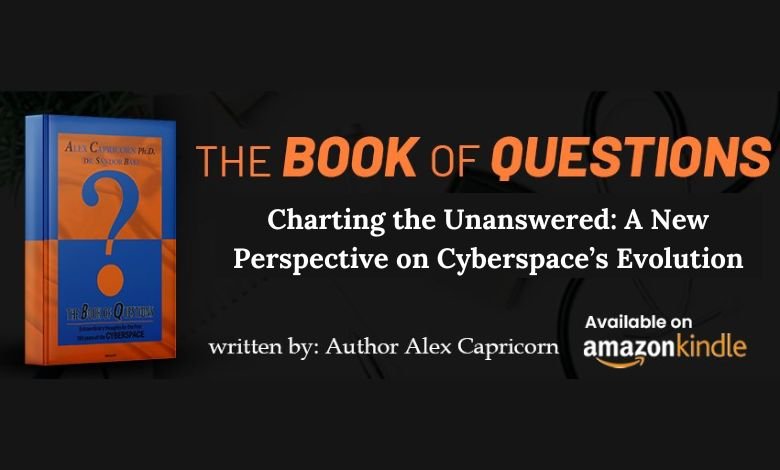Introduction
In the past century, cyberspace has transformed from a technical concept into an integral part of human existence, influencing how we live, work, and interact with each other. However, while we may be adept at using digital technologies, the larger philosophical questions surrounding cyberspace remain unresolved. In The Book of Questions: Extraordinary thoughts for the first 100 years of CYBERSPACE, Alex Capricorn, challenges readers to confront these deeper issues. His thought-provoking inquiries serve as a guide for understanding the complexities of cyberspace while encouraging reflection on how it continues to shape human behavior and society. In this article, we explore the distinct and essential questions raised by Capricorn, illustrating the need for broader contemplation about our digital lives.
Revisiting the Nature of Cyberspace
One of the most compelling aspects of Capricorn’s book is his ability to frame cyberspace not merely as a technological development but as an evolving entity that redefines how we understand reality. The book does not simply focus on how we use the internet but on what it represents. Capricorn raises questions such as: Is cyberspace a parallel world or an extension of the physical one? Does its existence challenge the very nature of reality?
Cyberspace’s rapid expansion has undoubtedly blurred the boundaries between the real and the virtual. In today’s world, individuals conduct business, maintain friendships, and even cultivate relationships without ever leaving the digital realm. Yet Capricorn invites readers to question whether this level of reliance on cyberspace might cause a detachment from the tangible world. Are we gradually becoming disassociated from our physical surroundings as we immerse ourselves in the digital?
These are profound questions, especially as we look ahead to the future of augmented reality (AR) and virtual reality (VR) technologies. Capricorn suggests that we may be standing on the precipice of a new form of existence one where the lines between physical and digital are irrevocably intertwined.
Ownership and Privacy in the Digital Age
In an age where personal data is treated as currency, questions surrounding privacy and ownership in cyberspace become paramount. Capricorn’s book confronts this dilemma head-on by posing critical questions about the control individuals have over their digital identities. When we use digital platforms, who truly owns the data we generate? How much of ourselves do we give away when we sign up for an app or service?
Capricorn’s inquiry extends beyond the surface-level debates about privacy policies and security protocols. He delves into the ethical questions surrounding the commodification of personal data. By asking whether cyberspace has turned individuals into mere data points for corporations to exploit, Capricorn underscores the importance of digital literacy and awareness. Are we aware of how our digital footprints are used, or have we become complacent in sacrificing privacy for convenience?
As companies continue to expand their influence in the digital realm, Capricorn urges readers to reflect on the implications of this growing imbalance. His questions challenge the status quo, encouraging readers to reconsider their roles not just as consumers but as stewards of their digital selves.
Cyberspace and the Changing Social Fabric
One of the standout sections in The Book of Questions revolves around the ways cyberspace has altered social dynamics. While the internet has undoubtedly created new forms of connectivity, Capricorn asks whether this increased interaction has genuinely led to a more connected world—or if it has created a facade of unity while deepening divisions.
The idea of digital communities versus real-life communities is a central theme. Capricorn’s questions probe whether online interaction can ever truly replicate the depth and nuance of face-to-face communication. In an era dominated by social media, where interactions are often filtered through screens and algorithms, Capricorn raises concerns about the erosion of meaningful human connection.
These questions are particularly poignant in a world where many individuals prefer digital interaction over physical encounters. Has cyberspace provided a false sense of companionship, one that may ultimately undermine genuine social bonds? Capricorn’s inquiries serve as a reminder that while cyberspace can offer many benefits, it also demands critical reflection about its long-term impact on human relationships.
Artificial Intelligence and Human Control
As artificial intelligence (AI) continues to advance, its role in cyberspace becomes ever more prominent. In The Book of Questions, Capricorn engages readers with a series of questions about the future of AI and the extent of human control over its development. At the heart of these inquiries lies a fundamental dilemma: Can humanity control the forces it has unleashed in cyberspace, or has the advent of AI created systems too complex for humans to govern?
Capricorn addresses issues such as algorithmic decision-making, AI-generated content, and the growing role of automation in everyday life. He encourages readers to ponder whether AI will continue to serve humanity or if it will eventually take on a life of its own. How much autonomy should we grant to machines that operate within cyberspace? Are we prepared for a future where AI influences nearly every aspect of digital life, from content moderation to social interactions?
These questions lead to broader reflections on the ethical responsibilities of AI developers and users alike. As AI increasingly integrates into cyberspace, the line between human agency and machine intelligence becomes ever more blurred. Capricorn’s inquiries provoke readers to consider the consequences of ceding too much control to autonomous systems.
The Ethical Dilemmas of Cyberspace Governance
As cyberspace continues to expand, the need for effective governance becomes more pressing. In his book, Capricorn asks probing questions about how cyberspace should be regulated. Should governments take a hands-off approach, or is strict oversight necessary to ensure that cyberspace remains a safe and inclusive environment? Who holds the authority to determine the rules that govern this global domain?
These questions are particularly timely as debates over internet governance intensify. Capricorn raises concerns about censorship, free speech, and the role of large corporations in shaping the digital landscape. By asking whether cyberspace has become a battleground for competing interests, he highlights the importance of maintaining a balance between freedom and responsibility.
The book also delves into the challenges of creating equitable digital spaces. Capricorn’s questions explore whether current governance models adequately address the needs of marginalized communities or if they exacerbate existing inequalities. He invites readers to consider the ethical implications of internet policies that privilege certain voices while silencing others.
A Call to Reflect and Act
Ultimately, The Book of Questions is not just a passive exercise in pondering the mysteries of cyberspace. Capricorn invites his readers to take action. His questions are designed to provoke thought, but they also challenge individuals to engage more critically with the digital world. Whether it’s questioning the ethical implications of AI or reflecting on personal data privacy, Capricorn encourages readers to become active participants in shaping the future of cyberspace.
The book’s open-ended nature ensures that readers from all backgrounds can engage with its content, making it a valuable resource for technologists, philosophers, policymakers, and everyday internet users alike. In this rapidly changing digital landscape, The Book of Questions serves as both a mirror and a guide, helping readers navigate the uncertainties of the digital age.
Conclusion
As cyberspace enters its second century, the need for reflection and critical inquiry is more important than ever. The Book of Questions: Extraordinary thoughts for the first 100 years of CYBERSPACE by Alex Capricorn, Ph.D., offers readers a unique opportunity to engage with the philosophical and ethical questions that define the digital age. By asking difficult but necessary questions, Capricorn empowers readers to think deeply about their relationship with cyberspace and their role in shaping its future. In a world that is increasingly reliant on technology, The Book of Questions provides the intellectual tools needed to navigate the complexities of this ever-evolving digital frontier.











